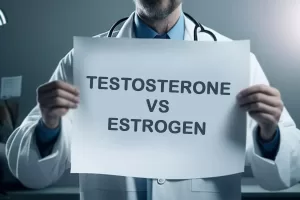Men who strive to shed weight or just eat healthily can have a concern regarding whether or not their diet will affect their hormones. We dived into the depth of academic research available on Pubmed and other trusted resources to deliver a ready-made answer to the question: “Is keto bad for testosterone or not?”.
To be brief, it seems that the keto diet may prove beneficial for men who want to improve their body composition and hormone balance simultaneously.
What is Keto
The keto diet is based on a specific balance of macronutrients. It is a high-fat, low-carbohydrate, and limited-protein diet.
Our main source of energy is usually glucose from carbohydrates. With keto, the body adjusts its metabolism and gains energy from ketones—compounds produced from fats. Because the organism is getting used to energy production from fats, it becomes easier to shed stubborn weight—of course, if the person keeps the calorie intake adequate and healthy.
Benefits and Drawbacks
Pros
- Higher energy levels. Our cells gain more ATP from ketones than glucose from carbs.
- Enhanced mental functions. Ketones are better for our brain as a source of energy.
- The mitigation of inflammation. For example, those who suffer from arthritis and joint pain also noted significant improvement from the diet.
- Provides good results in weight loss.
- There is clinical evidence that confirms the medical potential of the keto diet in metabolic syndrome and endocrine disorders. For example, keto improved blood sugar and insulin sensitivity which is helpful in type 2 diabetes management.
- The diet helps to manage “good” and “bad” cholesterol levels, manage levels of sodium, and reduce blood pressure which is good for cardiovascular health.
Cons
- Keto has side reactions. First, there is an adaptation period known as “keto flu” due to the similarity of its symptoms to those of the common flu. One can experience weakness, fatigue, mild fever, muscle pain, etc. Other short-term and long-term reactions are individual and vary from GI disorders to a mineral deficiency.
- Ketogenic diet has contraindications as well. When you plan to change your nutrition so drastically, it is better to consult your doctor priorly.
- The nutritional plan is hard to balance and maintain. The slightest mistake can throw you off ketosis. Moreover, one should carefully balance their meals to keep a sufficient supply of nutrients.
Keto Diet and Hormones
The ketogenic diet has a known impact on five important human hormones:
- Insulin. We touched on the subject earlier when discussed keto benefits for diabetic patients (management of blood sugar, weight loss, insulin resistance reduction, etc.).
- Cortisol. We know that it is an infamous stress hormone. What is less known is that cortisol promotes fat accumulation and raises blood sugar and insulin. During the adjustment period on keto, cortisol levels may increase. The long-term keto diet, however, may decrease cortisol levels as the body gets adjusted to the new energy source.
- Aldosterone is a hormone that regulates blood pressure by managing sodium and potassium levels. Its levels rise with an insulin spike; the hormone triggers mineral excretion by the kidneys which, in turn, increases blood pressure. During keto, insulin levels get low, and so does aldosterone. This also helps to manage high blood pressure.
- Thyroid hormones have an immense impact on our metabolism, weight, body composition, muscle growth, etc. A ketogenic diet demonstrated the potential to improve the sensitivity of thyroid hormones (making them more effective) and alleviate certain thyroid disorders.
- Testosterone. As the main goal of our article is to investigate the keto diet’s effect on testosterone, we are talking about it in a separate section.
How Keto Affects Testosterone Levels
The keto diet has several possible mechanisms of impact on testosterone:
- Cortisol inhibits T production, and long-term ketosis decreases cortisol levels.
- T is produced from cholesterol, and keto improves levels of good cholesterol leaving more material for testosterone synthesis.
- Obesity is one of the factors that promote TD, and keto helps to lose weight.
- Diabetes is another condition linked with TD; low-carb diets help with diabetes management.
These factors lead to a logical conclusion that the keto diet is good for testosterone levels.
Scientific Studies
Alas, the studies that focus on the matter specifically are very limited. For instance, there was research on the keto effect on obese male patients. 17 men in their 40s with a BMI over 36 demonstrated much less fat percentage and increased testosterone levels after a month of ketosis and strict limitation of the calorie intake.
Another study included 25 resistance-trained young males who were divided into two groups: the keto diet group (KD) and the traditional western diet group (WD). After 11 weeks, only participants in the KD group had significant improvements in body composition, physical performance, and total testosterone levels.
On the other hand, there are many studies confirming that low-fat diets cause a huge drop in testosterone levels. While this is closer to negative evidence, it is still evidence nonetheless.
Surely, having more studies and data would be great to further improve our understanding of the subject. However, based on the preliminary data, we can say that keto raises testosterone.
Monitoring Testosterone While on Keto
We mentioned that it is important to have a talk with your healthcare provider before starting any diet. If you already are on a low-carb diet, do not forget about the necessity to have regular medical check-ups to control your cholesterol and nutrients. If you are cautious about your T levels, your doctor can order an additional blood test to keep your hormones in check and track your health progress.
Testosterone Replacement Therapy and Keto Diet
Testosterone replacement therapy, often abbreviated as TRT, is a medical way of TD treatment. The patient receives external steroids through medications: injections, patches, pills, gels, etc. The interaction between TRT and a low-carb diet was not researched specifically but there is no reason to believe that keto will somehow interfere with the therapy effect. In any case, TRT is always conducted under strict medical control, so the patient will be monitored for any changes, and the treatment can be adjusted if needed.
Increase Testosterone Naturally
TRT is not the only evidence-based way to give testosterone synthesis a good push. A healthy way of life can help you increase your T levels without turning to medication.
Fitness
It is a scientifically proven fact that physical activity promotes testosterone production! Not to mention other health benefits that both directly and indirectly affect your metabolism: better mood, stronger body, better blood flow, etc.
Balanced Diet
Your nutrition determines if your body receives all the elements it needs for health. In the case of keto, one should be especially careful to maintain the intake of vitamins, minerals, amino acids, and other valuable compounds. The good news is that many healthy T-boosting products are perfectly compatible with keto! Some examples of them are:
- Seafood, especially fatty fish, such as salmon;
- Olive oil;
- Pomegranates and red berries;
- Green vegetables;
- Raw onion, garlic, lemons.
Stress and Cortisol
Cortisol levels rise due to stress, which suppresses testosterone production. Stress management and good sleep (insomnia is associated with elevated cortisol levels) are essential for the body to repair properly and maintain all of its functions at a good rate.
Sun or Take a Vitamin D
Cholecalciferol, aka vitamin D, and testosterone, certainly have a link. Studies show that patients with an improvement in their levels of vitamin D also had an increase in T. The most popular method to get more vitamin D is sunbathing. However, we should remind you that exposure to UV light increases the risk of skin cancer. Do not forget about shadows while enjoying the sunny weather, use SPF, or just take a good supplement.
Summary
Preliminary scientific data shows that keto with testosterone is a good combination, especially when complemented with physical training. While the keto diet can be hard to maintain and requires professional monitoring, it can be beneficial for those who seek to both lose weight and improve their testosterone production.
FAQs
Does keto increase testosterone?
Yes, currently available scientific data speak in favor of this theory.
Is the keto diet good for testosterone?
It is, under the condition the person has their health monitored controls calorie intake, and exercises.
Does ketosis lower testosterone?
There is no scientific evidence of the negative impact of the keto diet on testosterone levels.







